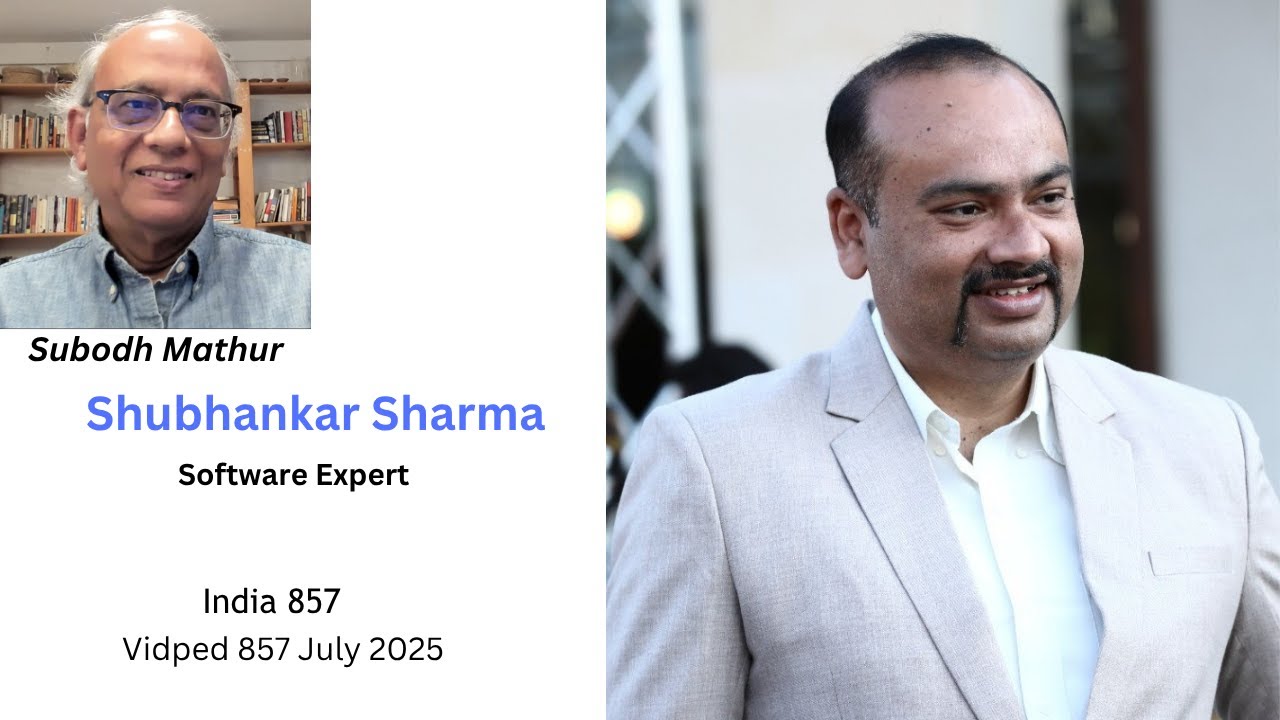Shubhankar Sharma
Education: Master of Science in Information Technology
With 16+ years of experience in IT/Software services, I have seen India’s outsourcing industry, changes in technology and the startup ecosystem.
When I started my journey in 2009, I had no clue where the world would move. Android and iPhone were just newbies in the market, a big revolution begun.
I take a deep interest in Indian society, global influence, and how things change. I regularly write on such topics.
On a personal side, I am a regular family man, a passionate motorcyclist who prefers to ride my bike and an enthusiast of Hindi cinema and music.
Current field of work:
Country Manager with In Time Tec, a global software company providing Information Technology / Software Services and Solutions
Sh. Hello everyone. I’m happy to be back with an expert this time. He’s a software techie. He’ll tell us what he does. Let’s listen to him. Right now we have with us Shubhanker Sharma. Over to you Mr. Sharma. Thank you very much sir. Uh first of all I would like to thank you for uh considering me and uh having a conversation. I started my journey in 2009 and that’s when my current company intech was established but I was working with a different company then so I have seen uh the growth in technology in IT software the outsourcing industry so in my current capacity I am working as a country manager with intech my role is to grow the business uh in different parts of the world and uh during the last 3 years uh we were initially based out of US and India we expanded to six other locations that pretty much covers the whole world starting from Australia to Colombia Gulf in Gulf we have a couple of offices and in Netherlands in Europe we have office South Korea So likewise, so I have been working in this industry and my primary role uh is to understand what exactly a business needs basically solving business problems through software and application of information technology and that’s where I it’s one of the areas that inspired me. I did my masters in IT and uh right after college I joined the industry started working with a US-based company. It is it is based out of East Coast. So uh my role was to filter out the opportunities with US public sector work on those opportunities and that was when the revolution the mobile revolution had started. Android and iPhone were new in the market. So I had an opportunity to see how it grew and how people accepted how it evolved the impact of technology on people uh in the lives of uh mankind basically. So other than that uh I also take interest in writing on different topics related to technology, society in general and how things are as I observe. So this is a bit about myself and I’m happy to uh take this conversation in a direction where uh it will be helpful for people to learn more about or I can share my experiences uh my learnings or whatever I have gained so far. Yeah, let’s go with the last your learnings and your experiences. So first of all I will begin uh with my childhood uh how I grew up. So I grew up in a joint family setup typical joint family setup of India and uh my maternal uh family was not far away. So going to my maternal uh grandfather’s house and in my family my paternal uncle had retired from the regional transport office. I was quite young. So I used to talk to him and he would tell me things about India before independence how it was then and uh how uh so some some uh experiences he would share with me. One such experience was seeing the British soldiers on the roads and the prisoners of war who were brought to India at that time. They would play football with people. How it was then that uh if there is a problem in electricity then you would simply register a complaint India before independence. So I had privilege to learn about that era from him and several other experiences of life. Uh the popular culture uh when I was not born from from that similarly I had different conversations with people who were senior to me they would tell me about their life experiences. So that’s how I developed a habit of talking with people from diversified areas not necessarily uh where I would be interested or confined to my circle. So that helped me to basically connect with people easily. So when I started my career, I started talking to people from the US though I never uh went to US. So it was easy for me because the human nature is same worldwide and uh in IT it is basically a driving force. So we are solving problems with an aid of technology essentially it’s the human problem. So communication understanding what really uh we need to solve. So beginning from that uh the second part was uh human nature understanding people. So my role is in sales. So wherever I went outside India so I realized that uh the common factors or emotions are same and people love when you acknowledge them uh their you understand their culture you respect them. So that kind of feeling I was uh at one point I preferred to stay in India but when I had an opportunity to go overseas so I understood that uh that’s so much to learn through experiences and that only happens when you meet with people from different cultures and backgrounds. So this is a bit of that side. Could you share one of these experiences which you remember going abroad meeting someone and you remember that oh this was important to me. Could you share something like that? Sure sir. So uh during my recent visit to uh Saudi Arabia uh we also have an office in Riyadhab uh the capital of Saudi Arabia. So I met with people from UK who were there uh working the locals over there. So I found that uh there are similar factors. For example in India we uh the street common street food is samosa. So in a Saudi restaurant there was uh this item samosa. So I I asked him is it Indian? So they said no we also have sambosa it’s popular it’s not that uh and karak chai they were also saying that word and then I was able to relate that uh in our language that we use in India there are some words of Arabic and Persian that we use without realizing that these are foreign uh words. Uh for example they were using which is almost we understand that. Yes. And similar similar things. Yes. And uh they say kal and we say kahal. So the similar dialects. Yes. It was easy for me to associate with them quite similar to us. They also have the family values and things. The typical middle class values are there also. So it helped me. I have very good friends over there, some colleagues and and friends. So that’s how I relate uh with people. Okay. Well, let me I think the common pattern Yeah. Let me tell you about samosa. I was in East Africa. They also have samosa. They call it sambusa. Okay. It’s a sam it’s a street food. So when I asked them that what is this? They say sir, oh you have copied it from us. No no no sir we have it is ours you know it is not Indian you have copied it from us so okay what can I say you know after all we have Mr. who says it is ours but it is common. Okay. Uh all right. Good. That is something that’s very valuable that you can find common things. People are people. Okay. There are differences of course but people are people. And I think what you’re saying is that you can be successful at sales when you recognize the commonality. Right. Right. and you are okay. All right. Wonderful. So tell me, let’s go back into the history. You know, as you said, you’ve seen the history. And when was the first time you heard the word app, you know, the smartphone came out and the smartphone was just a way to quickly get to the web, right? In your hand, right? But then, right, sir, the whole idea was that you don’t go to the web, you go to the app. So when did you hear the word app and what did you think of it? So it was uh in the late 2000s I the word app and I did not uh I graduated without a phone only when I was uh in my masters and I was living away from family. I had a Nokia keypad phone but my graduation was without a phone and at that time when I was in college the word app was not in uh popular talks and similarly because that also excites me to share with you good self because people uh from your generation uh they studied when there was a strong British influence in India. So the language that is used because uh I can clearly see that and uh with the era of internet and computers uh we gradually came closer to the American uh literature or the the way they say uh things and they say cab and earlier we used to say taxi and uh likewise a lift or elevator these words and color so app uh certainly uh my brother-in-law uh had a smartphone and uh he used to tell me and then when I started working so I was in this industry so I was uh familiar with the kind of uh operating systems uh used by Blackberry uh at that time and the US president would use a Blackberry phone and uh what was used with Android and and that’s when uh Google launched uh market now it is called Google play earlier it was called market iTunes or app store uh so in the late 2000s I uh became acquainted with app was it a sense of excitement did you think at that time that this is big this is new this is exciting or was it just one more develop velment in your journey. No sir, it was very exciting uh because uh uh I was able to figure out that something big is coming because uh it was handy and it was accessible. Anyone could use it and uh social media had already arrived in India and uh before the phone it was only limited to uh those uh who had laptops or computers. But with the smartphone anyone would uh join uh this. So there was some curiosity in my mind and I used to talk to people that what kind of apps uh they were using. So the first uh answers were uh that some people were using for for dictionary they used to check the meanings of words. Some people were using to draw something like like a drawing tool. these were common and then some for entertainment they were using. So it was very exciting and uh I because of my role was to uh develop apps. So uh I used to talk to uh the engineers as well as uh in my uh circle with friends at and when I used to uh take some interviews my first question would be that what are the frequently used apps or what apps you use? Some people would say Google maps or uh frequently used uh some say radio and then WhatsApp had had come uh WhatsApp came I think uh after uh 2010 early uh 2010s it had come. So I used to send uh pre SMS messages and WhatsApp had just come. So that would excite a lot that uh some problem is solved and uh so I have pretty much followed the app revolution and uh also from both angles as uh being part of the industry as well as a user just a regular user. So you are on mute please. So what do you think of it all after 15 years of living in the app world and in the growth and all that? Any thoughts? There is a strong impact both positive as well as negative. Uh I have a son uh who attends school I can see of his age and uh several other children. So uh it has simplified lives for sure. Uh in India apps are part of regular life uh because you can on demand services are accessible using an app and uh so most of the services uh have come handy. You can just uh tap an app and use it. This is the positive side say and the negative side is of course overuse of uh uh apps and uh the kind of content which is served through these apps uh depending on what age group uh is using. So there is the something concerning without a second thought because uh uh the developers or content creators are and with AI especially. So the kind of uh content uh being served through these apps are uh somewhere there has to be some limit. Uh I think there are both sides. Okay. The positive as well as the dark side. Okay. Now you just mentioned AI. So tell us about how you think that what it is doing already in India, what changes are likely to come. If you know or if you’re interested, please tell us from your perspective. So I’ll sure sir. So I’ll begin with myself. Uh it is certainly helping in productivity. A task that would take uh for example 3 weeks can be uh completed in few days one day or two day and sometimes in hours uh using AI. So that’s the positive side of it. uh and uh lots of possibilities uh but I strongly feel that uh AI can be your ally if you are using AI as its superior commanding AI using it as your assistant to help you in uh getting things done. This is one part. Second uh aspect is that overd dependence on AI. So let me give an example that if you don’t know how to write an application and you use AI then you cannot judge the application is appropriate or not but if you know it you can write on paper and then you use AI so I think it’s a blessing or a help. So in India there is an impact of course uh it so with uh generative AI which is the easiest form of AI chat GPT and Google Gemini most people are aware of it they are using it uh and professionally also as well as personally so and it’s amazing uh I get feedback from people that they are just uh surprised about the results how it remembers what they ask and how it helps them. So in India it’s uh I would say that people are it’s no no more an alien concept. At one time uh not many were having idea what AI is. My father when I was in college used to ask me what is artificial intelligence and those things just from university was difficult for me to explain but now he’s also following he’s also using so I think uh India is catching up with the world we have no shortage of talent to develop AI as well as the consumer aspect of AI okay so wonderful so overall you say yes to AI. You’re not thinking, “Oh my god, jobs will be lost and things like that.” You’re saying, “No, whatever it is, AI is good. It’s overall it’s helpful.” Overall, it’s helpful. But I cannot deny that job will be lost because uh a junior person doing a repeat job that can be uh done using AI. So there will be an impact. there are uh there is an impact of course because some big companies have announced layoffs. I cannot say that it’s because of AI but uh uh I can see in software if a senior person using a team of two or three people used to do a job. So it can be done using AI replacing two three people. So the impact will be there no denying on that. Okay fine. Okay. Um, let me ask you this. What tips do you have for young people? I mean, you have found your way. You’re doing worldwide travels and so on. What tips do you have for young people keeping in mind that they will grow up differently than you and I did? They growing up in this digital land, AI land. What tips do you have for them? I can because I have seen several generations and every four five years uh there is a shift in uh the mindset and the best way to experience uh how generational uh changes take place is watching the cricket team Indian cricket team. Yeah. So there is a generation of uh Mr. Gawaskkar when he used to play. Then there is a generation of Mr. Tendulkar when he used to play such an era. Then came the uh the Kohli era and now we have the young team. So we can see there is a difference in earlier it was more of a gentleman game. no one would talk or like that. And now I would I notice uh in youngsters uh I think uh they are if I talk about the fundamental difference one is uh for short talking back uh there is a change in how when I joined the industry most people of my age how they communicated with their team and senior here. So there is a change in uh interacting with people. That’s one. Second is uh habits. So I can see that uh because so much is available right now and uh by God’s grace India is also moving upward in the economic uh tree. There is most youngsters uh start their career and they’re getting handsome uh packages. So they also catch up things where they get addicted to uh I will not mention but specifically it spoils their health. That’s the first factor I can see. Uh it is twofold. One is bad habits. Second is uh taking it casually because they are young. So they don’t realize that what will be the long-term damage uh to them. So first tip is uh taking care of your health and for which you need to lead a neat and clean life and uh it’s good to have experiences but uh I I can see the difference in the preceding generation and the current generation because uh if you talk about our culture so earlier people had their own interests some people were fond of playing musical instruments and some would were into sports. I I’m seeing that uh the current generation uh and I’m specific to India. So we have been uh somewhere copying or mimicking how the rest of the world uh or the perhaps the developed countries uh have been living and uh that’s how the culture of clubs or pubs and uh night outs those things uh have been introduced uh in India as well and there there is nothing wrong to go there and experience at the same time You need to develop some healthy uh habits and you need to keep a circle that inspires you to contribute something positive. Uh not just uh accepting mediocrity in your life and just because youth is uh where you see your prime when you are healthy or capable your brain works in a random fashion rather than organized fashion. So take full advantage of that era and uh because the rest of your life you you you will be uh used to some patterns and you’ll be uh leading your life uh through those patterns. But when you are young just uh learn things, acquire skills, uh do something that takes you extra mile and most important take care of your health and understand the why factor why you’re doing it. So this these are some of the things I would share with the All right. So thank you for that. U let me just ask you know is there anything else you want to add here? uh specifically for uh just in your own mind whatever it is that you want no not to young people anything else that you want to add here tell us about. So my uh uh most important uh point uh that I had in my mind uh before coming uh to have this conversation is uh that where do we stand in on the global scale. So we always had talent. There was abundance of talent in our country. Uh there was no shortage of talent and can be uh verified. every generation has something to contribute. Uh so now is the time we also have facilities. Uh and we have good facilities uh that can be utilized. I think that uh the mindset uh uh typically has been to take the easy approach towards uh things. It can be uh if I talk about our industry so all the MNC’s uh that hail from India so they are tagged as services uh companies rather than product companies with an exception of few there are some well-known product companies as well so I think uh now is the time uh that uh we should and we must uh capitalize on the talent that we have and uh change this perspective that we can develop top-notch products and uh that’s most important because uh I since my childhood I have seen that uh there was one time when a word called imported was given much importance this is an imported pen this is an imported tape recorder this is an imported because there was a general uh feeling in our society that something which is imported from a foreign country is of high quality that was common at that time. Then we also started uh if you talk about our auto sector, Indian companies are doing very good uh developing very good uh cars likewise but I think uh we are overdependent on countries like China. uh the trade def deficit with China is at record high uh considering uh that we have been importing more from China than exporting it’s official data u that I access similar uh things with us uh so I think the geopolitics as well as where we stand so every citizen has to think from that perspective that uh what contribution I am making uh as an Indian to make India uh strong enough and uh what message is left for the next generation. So whenever I go to a college and I’m invited to talk to youngsters so I talk to them in that sense that you’re not competing amongst the Indians or uh if I go to an NIT then you are not just competing with NIT or IIT you’re competing at global level think start thinking from that angle this is uh where I see and I would say that this is nationalism not by speaking or telling something this this nationalism how you live daily so keeping uh somewhere your country foremost whatever you do this is uh this I wanted to just express okay well thank you so much Mr. Sharma this is a very powerful message for young people based on your you know life long back I say long back not as long as me but long back because the world has changed you know since we were young the world has changed we couldn’t even imagine such a thing or forget to want such a thing we couldn’t even imagine but we are living with it and we are comfortable with it so your message is very clear and let’s see if you has something else to add otherwise we can end it here. Uh thank you so much sir. I think uh this is good. Uh and uh once again uh I am grateful for having a conversation. Okay good. Let’s end it here. Stay online please. I want to talk to you about a little bit offline. So let’s end it here today. I’ll be back with another young person or an expert. So till then bye everybody.







